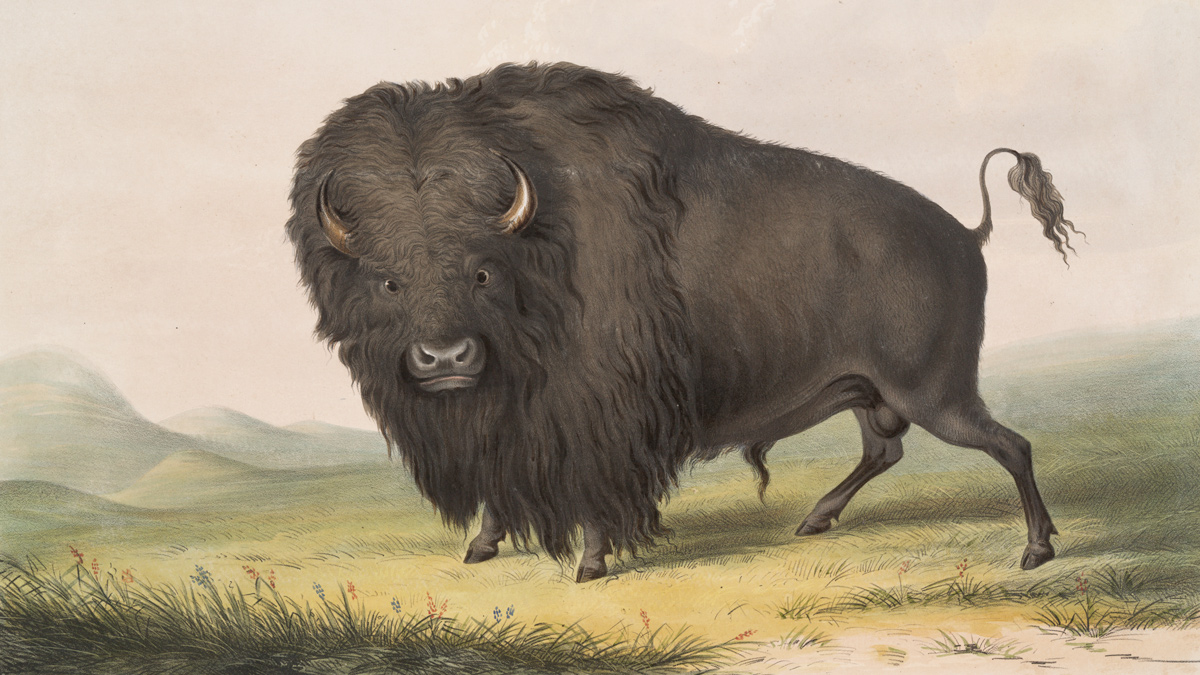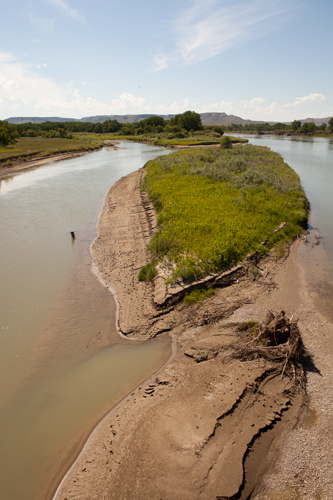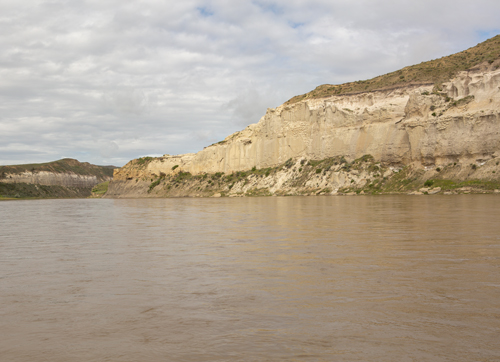During the night, a frightened bison runs amok damaging York‘s gun and the white pirogue‘s swivel gun. Lewis’s dog Seaman saves the day by diverting it away from camp. They continue up the Missouri passing “Judieths River” and camping above the “slaughter river”—present Arrow Creek—where numerous dead bison have washed ashore.
Buffalo Bull Grazing
by George Catlin
Catlin’s North American Indian portfolio: Hunting scenes and amusements of the Rocky mountains and prairies of America. Rare Book Division, The New York Public Library.[1]New York Public Library Digital Collections. Accessed October 31, 2019, digitalcollections.nypl.org/items/510d47da-dbe5-a3d9-e040-e00a18064a99.
Bison Terrorizes Camp
Last night we were all allarmed by a large buffaloe Bull, which swam over from the opposite shore and coming along side of the white perogue, climbed over it to land, he then alarmed ran up the bank in full speed directly towards the fires, and was within 18 inches of the heads of some of the men who lay sleeping before the centinel could allarm him or make him change his course, still more alarmed, he now took his direction immediately towards our lodge, passing between 4 fires and within a few inches of the heads of one range of the men as they yet lay sleeping, when he came near the tent
—Meriwether Lewis
Seaman Saves the Day
my dog [Seaman] saved us by causing him to change his course a second time, which he did by turning a little to the right, and was quickly out of sight, leaving us by this time all in an uproar with our guns in or hands, enquiring of each other the case of the alarm, which after a few moments was explained by the centinel; we were happy to find no one hirt.
—Meriwether Lewis
White Pirogue’s Evil Genie
The next morning we found that the buffaloe in passing the perogue had trodden on a rifle, which belonged to Capt. Clark’s black man [York], who had negligently left her in the perogue, the rifle was much bent, he had also broken the spindle, pivit, and shattered the stock of one of the bluntderbushes [swivel gun] on board . . . . it appears that the white perogue, which contains our most valuable stores, is attended by some evil gennii.
—Meriwether Lewis
Below the Judith River
© 24 July 2013 by Kristopher K. Townsend. Permission to use granted under the Creative Commons Attribution-Share Alike 4.0 International license.
Judith’s River
passed a handsome river which discharged itself on the Lard. side . . . . Cap. C who assended this R. much higher than I did has call it Judieths River.
—Meriwether Lewis
In the accompanying photo, the Judith River is hidden behind the row of cottonwood trees in the upper center. The visible water is entirely the Missouri River as it flows around some small islands.
Cliffs at Arrow Creek (Slaughter River)
© 23 May 2016 by Kristopher K. Townsend. Permission to use granted under the Creative Commons Attribution-Share Alike 4.0 International license.
Slaughter River
today we passed on the Stard. side the remains of a vast many mangled carcases of Buffalow which had been driven over a precipice of 120 feet by the Indians and perished; the water appeared to have washed away a part of this immence pile of slaughter and still their remained the fragments of at least a hundred carcases they created a most horrid stench.
—Meriwether Lewis
Ardent Spirits
fixed our camp and gave each man a small dram. notwithstanding the allowance of sperits we issued did not exceed ½ pn. man several of them were considerably effected by it; such is the effects of abstaining for some time from the uce of sperituous liquors; they were all very merry.—
—Meriwether Lewis
Weather Diary
State of thermometer at rise
Weather Wind at rise
State of thermometer at 4 P. M. Weather Wind at 4 P. M. State of the river 62 [above 0] cloudy after rain S. W. 67 [above 0] rain S. W. raised 1 in. rained but little, some dew this morning.
—Meriwether Lewis[2]To assist the reader, the editor of this web page has omitted the date column, merged the “State of the river” columns, and spelled out some abbreviations.
Experience the Lewis and Clark Trail
The Lewis and Clark Trail Experience—our sister site at lewisandclark.travel—connects the world to people and places on the Lewis and Clark Trail.
Plan a trip related to May 29, 1805:

Lewis and Clark Camp at Slaughter River is a High Potential Historic Site along the Lewis and Clark National Historic Trail managed by the U.S. National Park Service. The campsite is publicly accessible via boat and is managed by the Bureau of Land Management.
Notes
| ↑1 | New York Public Library Digital Collections. Accessed October 31, 2019, digitalcollections.nypl.org/items/510d47da-dbe5-a3d9-e040-e00a18064a99. |
|---|---|
| ↑2 | To assist the reader, the editor of this web page has omitted the date column, merged the “State of the river” columns, and spelled out some abbreviations. |





